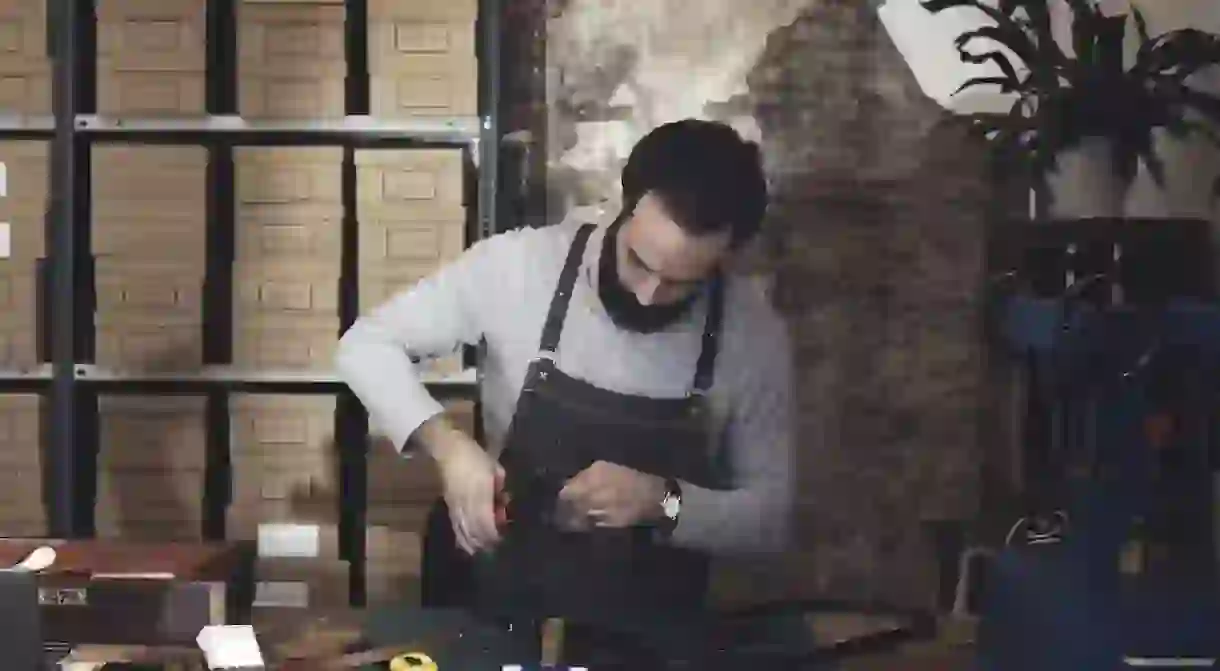Meet the Shoemaker in Barcelona Who Sees Crypto in His Future

Barcelona-based entrepreneur and shoe-maker Thiago Maximo sells traditional Portuguese boots inspired by those worn by his grandfather. When it comes to business though, Thiago is very much looking to the future for inspiration as he sees cryptocurrency offering new opportunities to small business owners.
Culture Trip: Thiago, you run a business called Urban Shepherds. Tell us what you do and what inspired your project.
As a child I always saw the boots on my grandfather’s feet, and I was fascinated by how leather acquired personality over time. As they aged their texture seemed more and more interesting to me. The boots that my grandfather wore were the shoes of the working class of the 1950s in Portugal, so they were sturdy, they were work boots, the shoes of the shepherds and farmers, of masons and technicians, of workers.
I never liked the throwaway consumption, nor have I paid much attention to fashion and trends. I am one of those who prefer to be governed by the authenticity and quality of things. For that reason, I continued using my boots, although they were not fashionable.
A few years ago, I moved to Barcelona. There people payed a lot of attention to the boots and they constantly asked me where they could get some. Then I had a vision: to manufacture the boots myself, in Portugal, with the same artisan methods of the time, and maintaining its original appearance, but using natural and recycled materials of the highest quality to guarantee the minimum impact on the environment.

‘Aged by fire’. Tell us what this technique is and where it originated.
Portugal can be a very hard place during winter. Some say that the shepherds used to dry their boots by hanging them inside the fireplace so the drying process would be faster. Sometimes by accident the boots would get slightly burned or darkened by the smoke.
We also heard from some old cobblers that the boots would get burned when the farmers in desperation would act as firefighters in order to save their lands. Portugal has always been known for its massive forest fires and there are a lot of stories of heroic farmers, some of them even losing their lives to save their lands. This ‘patina’ method is a tribute to these people and their stories.

Your shop is based in Barcelona’s El Born neighbourhood. Tell us a little about this area and what makes it special.
El Born is the traditional artisan’s neighbourhood, so local customers used to come here to buy these kinds of goods. It is also a very charming area: its narrow streets almost make it look like a little village, its peculiar architecture… it’s no wonder that everyday thousands of tourists and locals walk around here.
These days Barcelona is considered one of the biggest startup hubs in Europe. What do you think contributes to Barcelona’s success as a place for new businesses?
Cataluña has a strong industrial and business tradition. Like any other city with a historic trading port, Barcelona has also made its business culture more open to what is happening in other places and countries.
Nowadays it’s one of the most multicultural cities in Europe and I think that is a key factor for businesses growth. In the creative field, it is a very stimulating city: it’s very cosmopolitan which means you can have access to a lot more input and so your own imagination expands.

Tell us about your personal experience of running a business in Barcelona. What’s the business culture like here? Was it easy getting started?
Starting up a business is difficult anywhere you plan to do it. But Barcelona seems to attract investors and entrepreneurs because it is a great field to test a product on the market. For me, it gave me the opportunity to show a local Portuguese product to a vast number of international customers.
What are some of the biggest challenges you’ve come up against as an entrepreneur? How did you start to think about using cryptocurrency and how do you think it could help?
The next challenge is to expand the brand all over the world thanks to global technologies. E-commerce offers us the chance to reach any customer anywhere in the world who wants to wear a pair of Urban Shepherds Boots, and that’s what we are working on right now.
This is what draws me to cryptocurrency. I think the concept that’s behind it is amazing, it makes sense. What’s more, I think there is a need in the market for that, a real demand.
On the other hand, for me personally, there are two main concerns on the business level that make it too risky for solopreneurs like me to jump into to accept it as a method of payment: fluctuation, and the time it takes to take it from the bank. Once those two are stabilised, I am sure lots of businesses will adopt this system too.

As an artisan working with a manual craft, how do new technologies come into play with what you do? How big a role does social media play in what you do?
As I mentioned earlier, our challenge now is to become a global brand and new technologies allow us to reach out to customers on a whole new level. We are selling a very niche product, for a very specific type of customer. The internet, email, e-commerce and social media allow us to reach these people and develop strong relationships with them regardless of where they are. It’s really essential as a tool for us to reach, seduce and sell our boots to the people we create them for.













